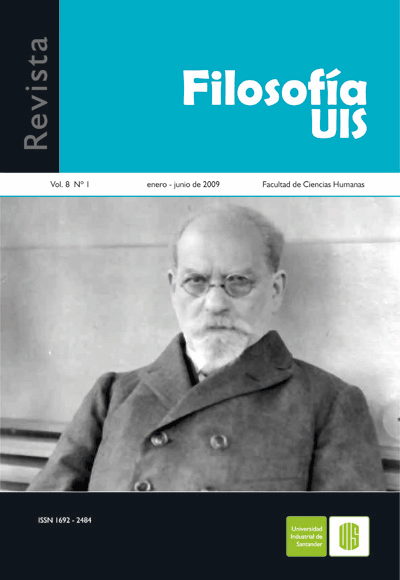Is the untranslatability between languages possible? Considerations around the Kuhn-Davidson debate
Published 2009-07-07
Keywords
- translation,
- charity principle,
- lexical categories,
- fixed points,
- observational sentences
How to Cite
Copyright (c) 2009 Valentina Contino

This work is licensed under a Creative Commons Attribution 4.0 International License.
Abstract
The article discusses the posibility or imposibility of partial failure of translatability between languages which have different systems of lexical categories. For that purpose we reformulate Kuhn's argument of not overlaping principle between taxonomic categories basing it on the thesis that every language requires from its speakers the acceptance of certain sentences (fixed points) in order to be qualified speakers. The necessity of not accepting sentences which are incompatible with those fixed points will prevent the possibility of translation.
Downloads
References
Davidson, D..: Sucesos mentales. Cuadernos de Crítica nº 11. México: UNAM, 1981.
Davidson, D..: “On the very idea of a conceptual scheme”, en Davidson, D (Ed.): Inquiries into truth and interpretation. Oxford:Claredon Press, 1973, págs. 183-199.
Davidson, D..: “La aparición del pensamiento, “en Davidson, D. (Ed): Subjetivo, intersubjetivo, objetivo. Madrid: Cátedra, 2003, págs. 34- 55.
Gaeta, R y Gentile, N.: Thomas Kuhn. De los paradigmas a la Teoría Evolucionista. Buenos Aires: Ed. Eudeba, Universidad de Bs. As., 2007.
Kuhn, T. S.: La estructura de las revoluciones científicas. México: Ed. Fondo de cultura económica, 1971.
Kuhn, T. S.: “¿Qué son las revoluciones científicas?” en Kuhn, T. S. (Ed.): ¿Qué son las revoluciones científicas? y otros ensayos. Barcelona: Ed. Paidós I.C.E de la Universidad Autónoma de Barcelona, 1989, págs 55-94.
Kuhn, T. S.: “Conmensurabilidad, comparabilidad y comunicabilidad”, en
Kuhn, T.S. (Ed.): ¿Qué son las revoluciones científicas? y otros ensayos. Barcelona: Ed. Paidós I. C. E. de la Universidad Autónoma de Barcelona, 1989, págs. 95-136.
Kuhn, T. S.: “El camino desde la estructura”, en Conant y Haugeland. (comp): El camino desde la estructura. Ensayos filosóficos, 1970-1993, con una entrevista autobiográfica. Buenos Aires: Ed. Paidós, 1990, págs. 13-26.
Moretti, A.: El concepto tarskiano de verdad. Buenos Aires: Ediciones de Fac. de Filosofía y Letras de la UBA, 1996.
Popper, K.: La lógica de la investigación científica. Madrid: Ed. Rei., 1987.
Quine, W. V. O.: “Dos dogmas del Empirismo” en Quine, W. V. O (Ed.): Desde un punto de vista lógico. Buenos Aires: Ediciones Orbis S. A. Hyspamérica, 1984, págs. 48-81.
Quine, W. V. O.: Palabra y Objeto. Barcelona: Editorial Labor S.A., 1968.
Stanford Encyclopedia of Philosophy.Relativism. En línea. Internet. 2 Febrero de 2003. Accesible en http://plato.stanford.edu/entries/relavism/#2 (Consulta 20/2/2008).
Stanford Encyclopedia of Philosophy.The Linguistic Relativity Hypothesis. En línea. Internet. 2 Febrero de 2003. Accesible en http://plato.stanford.edu/entries/relavism/supplement2.html (Consulta 21/2/2008).
Whorf, B. L.: Lenguaje, pensamiento y realidad. Barcelona: Ed. Barral, 1978
